Farncombe Institute 2024 International Symposium
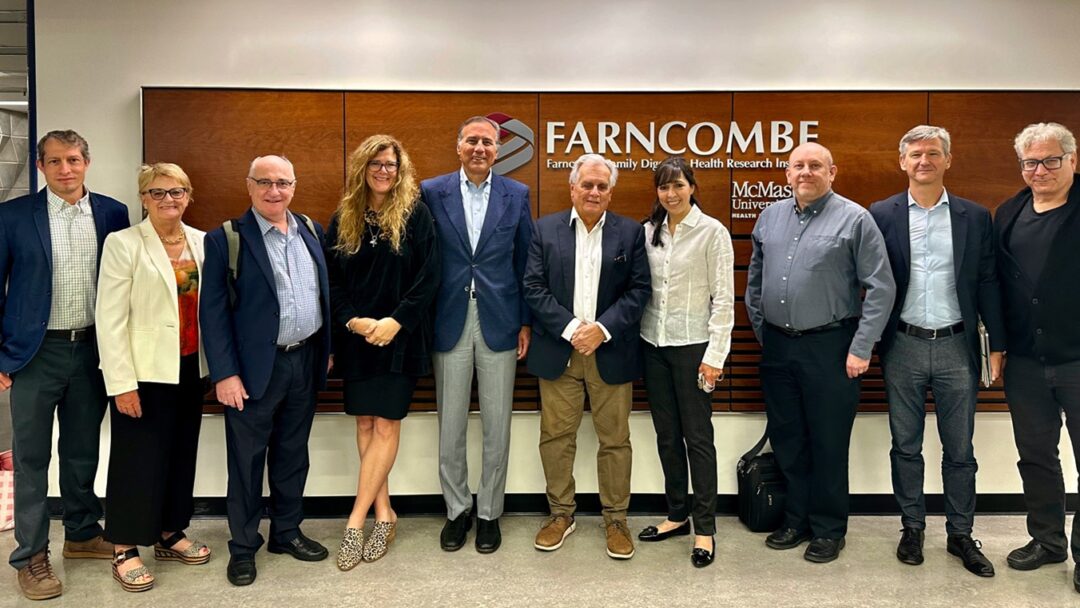
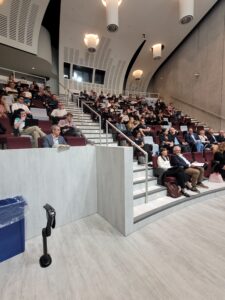
The Farncombe Institute 2024 International Symposium was held at McMaster University’s Faculty of Health Sciences on June 5th following a meeting with its 2024 Scientific Advisory Board. The theme of this year’s symposium was “Advancing Microbiota and Dietary-Based Therapies in Gastrointestinal Disease”. The symposium covered a broad spectrum of clinically important conditions that included inflammatory bowel disease, celiac disease, irritable bowel syndrome and maternal-fetal health. Talks ranged from basic discovery science to translational and clinical research.
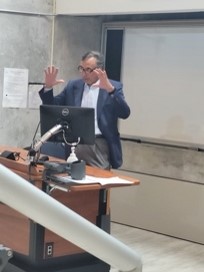 Dr. James Versalovic, Professor and Vice-Chair, Department of Pathology and Immunology, Baylor College of Medicine, opened the symposium by addressing dietary and microbial interactions and their impact on the host. In reviewing the microbiota literature, he commented that while microbial composition is subject to much variation in health, microbial metabolite profiles are generally conserved, stressing that this has important implications for future research. He provided examples of how microbial metabolites influence several aspects of host function including immune responses, blood pressure and susceptibility to cardiovascular disease. He also discussed the ability of probiotics to generate bioactive compounds, such as histamine, to modulate intestinal inflammation.
Dr. James Versalovic, Professor and Vice-Chair, Department of Pathology and Immunology, Baylor College of Medicine, opened the symposium by addressing dietary and microbial interactions and their impact on the host. In reviewing the microbiota literature, he commented that while microbial composition is subject to much variation in health, microbial metabolite profiles are generally conserved, stressing that this has important implications for future research. He provided examples of how microbial metabolites influence several aspects of host function including immune responses, blood pressure and susceptibility to cardiovascular disease. He also discussed the ability of probiotics to generate bioactive compounds, such as histamine, to modulate intestinal inflammation.
Dr. Neeraj Narula, an Institute member, discussed the role of processed and ultra-processed foods (UPF) in the susceptibility to, and natural history of inflammatory bowel disease. He emphasized that while processing of food is ubiquitous, ultra-processing involves incorporation of non-nutrient industrial ingredients that include colourants and flavours. He described how UPFs are associated with increased mortality, risk of type II diabetes, malignancy and possibly, to degenerative brain disorders. In the context of IBD he described how UPF is deleterious by influencing the microbiota and intestinal barrier function. He described the results of the PURE study demonstrating the impact of processed foods on susceptibility to IBD. Future work will evaluate whether UPF alters the natural history of established IBD.
 Dr. Zeinab Hosseinidoust, a biomedical engineer with expertise in phage, and member of the Institute, described her ongoing work on the potentially beneficial interactions between phage and bacterial pathogens in the context of experimental colitis in mice colonized with a limited but well-defined microbiota. Her interest in developing phage-based therapy for IBD is supported by her program of bacteriophage bioengineering aimed at generating platforms for phage delivery in a variety of clinical contexts.
Dr. Zeinab Hosseinidoust, a biomedical engineer with expertise in phage, and member of the Institute, described her ongoing work on the potentially beneficial interactions between phage and bacterial pathogens in the context of experimental colitis in mice colonized with a limited but well-defined microbiota. Her interest in developing phage-based therapy for IBD is supported by her program of bacteriophage bioengineering aimed at generating platforms for phage delivery in a variety of clinical contexts.
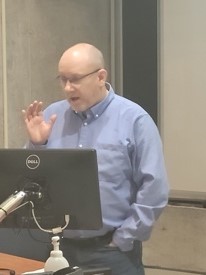 Dr. Bruce Vallance, Professor of Pediatrics (Gastroenterology), UBC and BC Children’s Hospital, Vancouver, and McMaster alumni, described how pathogenic microbes subvert the gut mucus barrier and its importance in enteric infections and inflammatory bowel disease. Using C. rodentium as a model pathogen, he described how this bacterium interacts with components of the mucus to gain access to the host’s epithelial niches, and the use of intestinal organoids to further evaluate underlying mechanisms. Ongoing work applies these approaches to investigate the permissive role of mucus destruction in the pathogenesis of IBD.
Dr. Bruce Vallance, Professor of Pediatrics (Gastroenterology), UBC and BC Children’s Hospital, Vancouver, and McMaster alumni, described how pathogenic microbes subvert the gut mucus barrier and its importance in enteric infections and inflammatory bowel disease. Using C. rodentium as a model pathogen, he described how this bacterium interacts with components of the mucus to gain access to the host’s epithelial niches, and the use of intestinal organoids to further evaluate underlying mechanisms. Ongoing work applies these approaches to investigate the permissive role of mucus destruction in the pathogenesis of IBD.
Dr. Alberto Caminero, a member of the Farncombe Institute, described the role of microbial protein metabolism in food allergy and inflammatory bowel disease. He discussed how dietary components that are resistant to human enzymes are metabolized by microbes resulting in the development of immunogenic or allergenic components that drive host responses in the context of food allergy and intolerances. He proposed that microbiota-directed therapies will play a role in patients with defined adverse reactions to food.
Dr. Heather Galipeau, a member of the Farncombe Institute, discussed the role of microbes in the pathogenesis of celiac disease and emphasized the importance of microbiota in the small intestine as opposed to other locations and not necessarily representative fecal samples. She discussed how dietary tryptophan is metabolized both the host and microbes leading to the production of anti-inflammatory ligands of the Aryl-hydrocarbon receptor in the gut. In addition to describing work in mice, she also described ongoing translational working humans evolving dietary tryptophan supplements.
 Dr. Ciaran Kelly, Director, Celiac Center, Beth Israel Deaconess Medical Center, Harvard Medical School, described non-dietary therapeutic approaches to the management of celiac disease. He stressed the many difficulties involved in maintaining adherence to a gluten-free diet and described several emerging therapies for non-responsive celiac disease. These include microbial or engineered glutenases, permeability regulators, transglutaminase-2 inhibitors, and nanoparticle-based approaches to induce immune tolerance in celiac disease. It remains to be determined how these approaches will change the clinical management of celiac disease.
Dr. Ciaran Kelly, Director, Celiac Center, Beth Israel Deaconess Medical Center, Harvard Medical School, described non-dietary therapeutic approaches to the management of celiac disease. He stressed the many difficulties involved in maintaining adherence to a gluten-free diet and described several emerging therapies for non-responsive celiac disease. These include microbial or engineered glutenases, permeability regulators, transglutaminase-2 inhibitors, and nanoparticle-based approaches to induce immune tolerance in celiac disease. It remains to be determined how these approaches will change the clinical management of celiac disease.
Dr. Ines Pinto-Sanchez, a member of the Farncombe Institute, discussed the nutritional problems in patients adhering to a gluten-free diet. These include specific nutritional deficiencies and imbalances, including over nutrition. She described deficiencies in micronutrients such as zinc, iron and vitamin D, among others. She emphasized the importance of a comprehensive nutritional assessment in the management of patients on a gluten-free diet and described the approaches taken in McMaster’s adult celiac disease clinic to identify and address these issues.
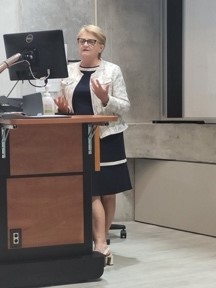 Dr. Mary L’Abbe, Professor at the University of Toronto and Director of the WHO Collaborating Centre for Nutritional Policy, described the complexities involved in identifying the exact composition of industry-derived food products. She described several approaches to the identification of ingredients based on food labelling, and the technologies ranging from personal apps to interrogating large databases and the use of artificial intelligence to analyze results.
Dr. Mary L’Abbe, Professor at the University of Toronto and Director of the WHO Collaborating Centre for Nutritional Policy, described the complexities involved in identifying the exact composition of industry-derived food products. She described several approaches to the identification of ingredients based on food labelling, and the technologies ranging from personal apps to interrogating large databases and the use of artificial intelligence to analyze results.
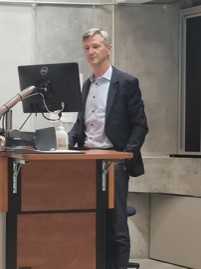 Dr. Guy Boeckxstaens, Professor of Neurogastroenterology at the University of Leuven, Belgium, described his work on the role of mast cells in the development of visceral hyperalgesia, a common problem in patients with irritable bowel syndrome with or without food tolerances. He discussed how infection or stress can break tolerance to dietary antigens and how this may lead to visceral hypersensitivity through mast cell sensitization, histamine release and activation of afferent neurons via histamine H1 receptors. He described how the H1 antagonist ebastine improved pain in a placebo-controlled phase 2 study in IBS patients. He also drew attention to a central nervous system consequence of mast cell activation resulting in IgE mediated “antigen avoidance behaviour”. This body of work increasingly supports the role of peripheral mechanisms in the expression of IBS, once considered a purely psychosomatic condition.
Dr. Guy Boeckxstaens, Professor of Neurogastroenterology at the University of Leuven, Belgium, described his work on the role of mast cells in the development of visceral hyperalgesia, a common problem in patients with irritable bowel syndrome with or without food tolerances. He discussed how infection or stress can break tolerance to dietary antigens and how this may lead to visceral hypersensitivity through mast cell sensitization, histamine release and activation of afferent neurons via histamine H1 receptors. He described how the H1 antagonist ebastine improved pain in a placebo-controlled phase 2 study in IBS patients. He also drew attention to a central nervous system consequence of mast cell activation resulting in IgE mediated “antigen avoidance behaviour”. This body of work increasingly supports the role of peripheral mechanisms in the expression of IBS, once considered a purely psychosomatic condition.
Dr. Giada De Palma, a member of the Farncombe Institute, discussed the role of microbial metabolism of dietary components in the modulation of pain. She emphasized the importance of food as the commonest stimulus for abdominal pain in a variety of gastrointestinal conditions including IBS. She described how high levels of urinary histamine associated with abdominal pain led to the search for a microbial origin of histamine. Microbiota from IBS patients with of dominant pain on a high fermentable diet and high urinary histamine levels conferred visceral hypersensitivity when transferred into mice. Her ongoing research is aimed at identifying specific bacteria with the capacity for high histamine production and to translate results into human studies involving IBS patients with abdominal pain.
Dr. Premysl Bercik of the Farncombe Institute described how the microbiota communicates with the brain in mice and humans. He presented studies involving germ-free mice whose abnormal behaviour could be corrected by bacterial colonization, including transient mono colonization and how this was accompanied by changes in brain chemistry. He showed how innate immune activation is a key initial step in this process and how ongoing research is identifying the subsequent steps leading to alterations in brain function and behaviour. He also described how the probiotic bacterium B. longum reduces anxiety in mice and demonstrated that administration of this probiotic improved depression in a pilot study involving IBS patients with psychiatric comorbidity. This behavioural improvement was accompanied by a reduction in activity of the frontal and temporal cortices of the brain. A multi-centre study of this probiotic is underway.
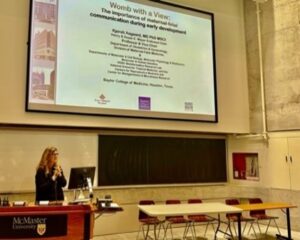 Dr. Kjersti Aagaard, Professor of Obstetrics and Gynecology, Maternal-Fetal Medicine, Baylor College of Medicine, Texas, closed the symposium with a provocative discussion of the role of the microbiota and microbial antigens in fetal programming in her talk titled “Womb with a View.” She reflected on the controversy surrounding whether the placenta is sterile. She described her own findings of the discovery of microbial antigens in amniotic fluid, implying an at least, immunological microbial cue to the fetus.
Dr. Kjersti Aagaard, Professor of Obstetrics and Gynecology, Maternal-Fetal Medicine, Baylor College of Medicine, Texas, closed the symposium with a provocative discussion of the role of the microbiota and microbial antigens in fetal programming in her talk titled “Womb with a View.” She reflected on the controversy surrounding whether the placenta is sterile. She described her own findings of the discovery of microbial antigens in amniotic fluid, implying an at least, immunological microbial cue to the fetus.

